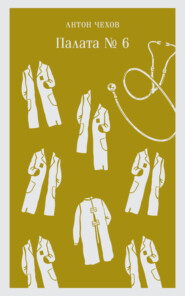По всем вопросам обращайтесь на: info@litportal.ru
(©) 2003-2024.
✖
The Schoolmaster and Other Stories
Настройки чтения
Размер шрифта
Высота строк
Поля
The watchman stops for a minute to light his pipe. He stoops down behind the traveller's back and lights several matches. The gleam of the first match lights up for one instant a bit of the avenue on the right, a white tombstone with an angel, and a dark cross; the light of the second match, flaring up brightly and extinguished by the wind, flashes like lightning on the left side, and from the darkness nothing stands out but the angle of some sort of trellis; the third match throws light to right and to left, revealing the white tombstone, the dark cross, and the trellis round a child's grave.
"The departed sleep; the dear ones sleep!" the stranger mutters, sighing loudly. "They all sleep alike, rich and poor, wise and foolish, good and wicked. They are of the same value now. And they will sleep till the last trump. The Kingdom of Heaven and peace eternal be theirs."
"Here we are walking along now, but the time will come when we shall be lying here ourselves," says the watchman.
"To be sure, to be sure, we shall all. There is no man who will not die. O-o-oh. Our doings are wicked, our thoughts are deceitful! Sins, sins! My soul accursed, ever covetous, my belly greedy and lustful! I have angered the Lord and there is no salvation for me in this world and the next. I am deep in sins like a worm in the earth."
"Yes, and you have to die."
"You are right there."
"Death is easier for a pilgrim than for fellows like us," says the watchman.
"There are pilgrims of different sorts. There are the real ones who are God-fearing men and watch over their own souls, and there are such as stray about the graveyard at night and are a delight to the devils.. Ye-es! There's one who is a pilgrim could give you a crack on the pate with an axe if he liked and knock the breath out of you."
"What are you talking like that for?"
"Oh, nothing.. Why, I fancy here's the gate. Yes, it is. Open it, good man."
The watchman, feeling his way, opens the gate, leads the pilgrim out by the sleeve, and says:
"Here's the end of the graveyard. Now you must keep on through the open fields till you get to the main road. Only close here there will be the boundary ditch – don't fall in… And when you come out on to the road, turn to the right, and keep on till you reach the mill.."
"O-o-oh!" sighs the pilgrim after a pause, "and now I am thinking that I have no cause to go to Mitrievsky Mill… Why the devil should I go there? I had better stay a bit with you here, sir.."
"What do you want to stay with me for?"
"Oh.. it's merrier with you!.."
"So you've found a merry companion, have you? You, pilgrim, are fond of a joke I see.."
"To be sure I am," says the stranger, with a hoarse chuckle. "Ah, my dear good man, I bet you will remember the pilgrim many a long year!"
"Why should I remember you?"
"Why I've got round you so smartly… Am I a pilgrim? I am not a pilgrim at all."
"What are you then?"
"A dead man… I've only just got out of my coffin… Do you remember Gubaryev, the locksmith, who hanged himself in carnival week? Well, I am Gubaryev himself!."
"Tell us something else!"
The watchman does not believe him, but he feels all over such a cold, oppressive terror that he starts off and begins hurriedly feeling for the gate.
"Stop, where are you off to?" says the stranger, clutching him by the arm. "Aie, aie, aie.. what a fellow you are! How can you leave me all alone?"
"Let go!" cries the watchman, trying to pull his arm away.
"Sto-op! I bid you stop and you stop. Don't struggle, you dirty dog! If you want to stay among the living, stop and hold your tongue till I tell you. It's only that I don't care to spill blood or you would have been a dead man long ago, you scurvy rascal… Stop!"
The watchman's knees give way under him. In his terror he shuts his eyes, and trembling all over huddles close to the wall. He would like to call out, but he knows his cries would not reach any living thing. The stranger stands beside him and holds him by the arm… Three minutes pass in silence.
"One's in a fever, another's asleep, and the third is seeing pilgrims on their way," mutters the stranger. "Capital watchmen, they are worth their salary! Ye-es, brother, thieves have always been cleverer than watchmen! Stand still, don't stir.."
Five minutes, ten minutes pass in silence. All at once the wind brings the sound of a whistle.
"Well, now you can go," says the stranger, releasing the watchman's arm. "Go and thank God you are alive!"
The stranger gives a whistle too, runs away from the gate, and the watchman hears him leap over the ditch.
With a foreboding of something very dreadful in his heart, the watchman, still trembling with terror, opens the gate irresolutely and runs back with his eyes shut.
At the turning into the main avenue he hears hurried footsteps, and someone asks him, in a hissing voice: "Is that you, Timofey? Where is Mitka?"
And after running the whole length of the main avenue he notices a little dim light in the darkness. The nearer he gets to the light the more frightened he is and the stronger his foreboding of evil.
"It looks as though the light were in the church," he thinks. "And how can it have come there? Save me and have mercy on me, Queen of Heaven! And that it is."
The watchman stands for a minute before the broken window and looks with horror towards the altar… A little wax candle which the thieves had forgotten to put out flickers in the wind that bursts in at the window and throws dim red patches of light on the vestments flung about and a cupboard overturned on the floor, on numerous footprints near the high altar and the altar of offerings.
A little time passes and the howling wind sends floating over the churchyard the hurried uneven clangs of the alarm-bell..
IN THE COURT
AT the district town of N. in the cinnamon-coloured government house in which the Zemstvo, the sessional meetings of the justices of the peace, the Rural Board, the Liquor Board, the Military Board, and many others sit by turns, the Circuit Court was in session on one of the dull days of autumn. Of the above-mentioned cinnamon-coloured house a local official had wittily observed:
"Here is Justitia, here is Policia, here is Militia – a regular boarding school of high-born young ladies."
But, as the saying is, "Too many cooks spoil the broth," and probably that is why the house strikes, oppresses, and overwhelms a fresh unofficial visitor with its dismal barrack-like appearance, its decrepit condition, and the complete absence of any kind of comfort, external or internal. Even on the brightest spring days it seems wrapped in a dense shade, and on clear moonlight nights, when the trees and the little dwelling-houses merged in one blur of shadow seem plunged in quiet slumber, it alone absurdly and inappropriately towers, an oppressive mass of stone, above the modest landscape, spoils the general harmony, and keeps sleepless vigil as though it could not escape from burdensome memories of past unforgiven sins. Inside it is like a barn and extremely unattractive. It is strange to see how readily these elegant lawyers, members of committees, and marshals of nobility, who in their own homes will make a scene over the slightest fume from the stove, or stain on the floor, resign themselves here to whirring ventilation wheels, the disgusting smell of fumigating candles, and the filthy, forever perspiring walls.
The sitting of the circuit court began between nine and ten. The programme of the day was promptly entered upon, with noticeable haste. The cases came on one after another and ended quickly, like a church service without a choir, so that no mind could form a complete picture of all this parti-coloured mass of faces, movements, words, misfortunes, true sayings and lies, all racing by like a river in flood… By two o'clock a great deal had been done: two prisoners had been sentenced to service in convict battalions, one of the privileged class had been sentenced to deprivation of rights and imprisonment, one had been acquitted, one case had been adjourned.
At precisely two o'clock the presiding judge announced that the case "of the peasant Nikolay Harlamov, charged with the murder of his wife," would next be heard. The composition of the court remained the same as it had been for the preceding case, except that the place of the defending counsel was filled by a new personage, a beardless young graduate in a coat with bright buttons. The president gave the order – "Bring in the prisoner!"
But the prisoner, who had been got ready beforehand, was already walking to his bench. He was a tall, thick-set peasant of about fifty-five, completely bald, with an apathetic, hairy face and a big red beard. He was followed by a frail-looking little soldier with a gun.
Just as he was reaching the bench the escort had a trifling mishap. He stumbled and dropped the gun out of his hands, but caught it at once before it touched the ground, knocking his knee violently against the butt end as he did so. A faint laugh was audible in the audience. Either from the pain or perhaps from shame at his awkwardness the soldier flushed a dark red.
After the customary questions to the prisoner, the shuffling of the jury, the calling over and swearing in of the witnesses, the reading of the charge began. The narrow-chested, pale-faced secretary, far too thin for his uniform, and with sticking plaster on his check, read it in a low, thick bass, rapidly like a sacristan, without raising or dropping his voice, as though afraid of exerting his lungs; he was seconded by the ventilation wheel whirring indefatigably behind the judge's table, and the result was a sound that gave a drowsy, narcotic character to the stillness of the hall.
The president, a short-sighted man, not old but with an extremely exhausted face, sat in his armchair without stirring and held his open hand near his brow as though screening his eyes from the sun. To the droning of the ventilation wheel and the secretary he meditated. When the secretary paused for an instant to take breath on beginning a new page, he suddenly started and looked round at the court with lustreless eyes, then bent down to the ear of the judge next to him and asked with a sigh:
"Are you putting up at Demyanov's, Matvey Petrovitch?"
"Yes, at Demyanov's," answered the other, starting too.
"Next time I shall probably put up there too. It's really impossible to put up at Tipyakov's! There's noise and uproar all night! Knocking, coughing, children crying… It's impossible!"

















